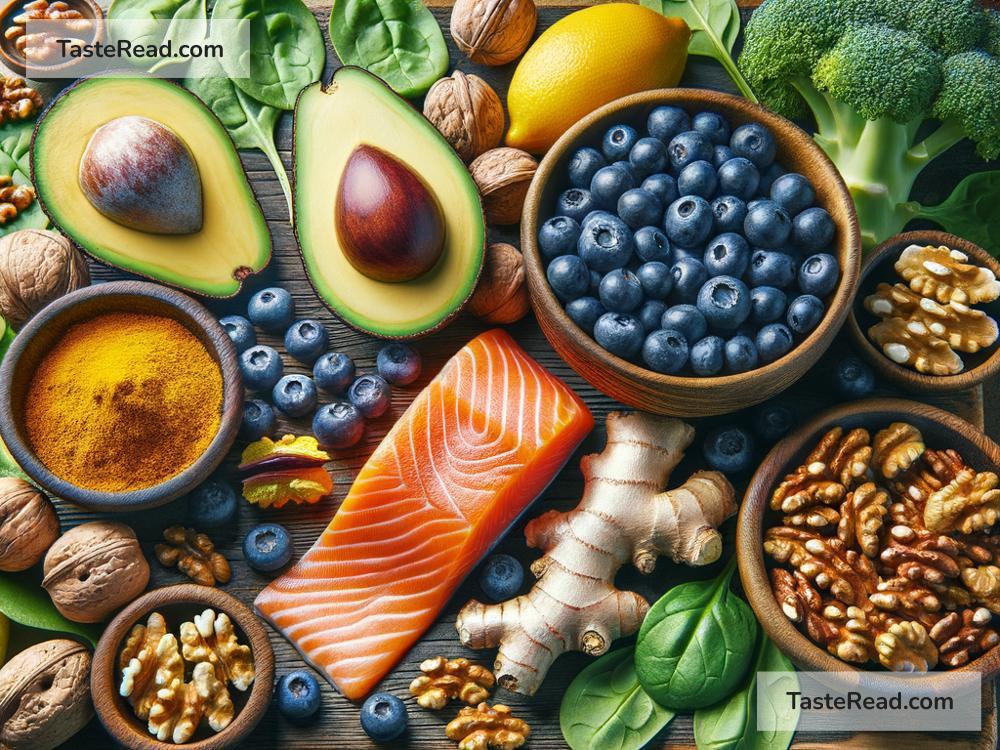Foods That Promote Healthy Inflammation Balance
Inflammation is a natural process in your body that helps to protect and heal it. When you catch a cold or scrape your knee, inflammation kicks in to fight infection and repair tissues. However, when inflammation becomes chronic—lasting for weeks, months, or even years—it can contribute to health problems like heart disease, arthritis, diabetes, and more. It’s like a fire meant to warm you, but instead, it burns out of control.
The good news is that what you eat can help balance and regulate inflammation. Certain foods have natural compounds that support healthy inflammation levels in your body. Let’s dive into the best foods to eat for an inflammation-fighting diet!
1. Fatty Fish
Fatty fish, like salmon, mackerel, sardines, and tuna, are loaded with omega-3 fatty acids. These healthy fats are key for reducing inflammation. Omega-3s help to block excess inflammatory signals in your body, making them a powerful weapon against chronic inflammation.
Try to include fatty fish in your meals 2-3 times a week. If you don’t love fish, you can also take omega-3 supplements, like fish oil or algae-based capsules.
2. Fruits and Vegetables
Fruits and vegetables are packed with antioxidants and nutrients that fight inflammation. Colorful produce tends to be the most beneficial, so aim for a rainbow of options on your plate.
Here are some of the best choices:
– Berries (like blueberries, strawberries, and raspberries): These are rich in antioxidants called anthocyanins, famous for lowering inflammation.
– Leafy Greens (like spinach, kale, and Swiss chard): Greens are filled with vitamins and minerals that help protect your cells from damage.
– Broccoli: Broccoli contains sulforaphane, a compound that fights inflammation and may even help prevent certain diseases.
– Avocados: They’re high in healthy fats and antioxidants that support a balanced inflammatory response.
Make fruits and veggies a cornerstone of your meals, whether that’s a fresh salad, roasted veggies, or a bowl of fruit for dessert.
3. Nuts and Seeds
Nuts and seeds are excellent sources of healthy fats, fiber, and anti-inflammatory compounds. Studies show that eating nuts regularly can help lower markers of inflammation and reduce the risk of chronic diseases.
Here are some great options:
– Almonds: Rich in vitamin E and healthy fats.
– Walnuts: Packed with omega-3 fatty acids.
– Flaxseeds and Chia Seeds: Both full of fiber and plant-based omega-3s.
– Pumpkin Seeds: Loaded with magnesium, which helps maintain proper inflammation levels.
Snack on a handful of nuts, sprinkle seeds into your smoothies or oatmeal, or use them as toppings for salads.
4. Whole Grains
Whole grains provide fiber, which is essential for controlling inflammation. Refined grains, like white bread and pasta, cause spikes in your blood sugar, leading to increased inflammation. On the other hand, whole grains are digested slowly, which keeps sugar levels steady and reduces inflammation.
Some delicious whole-grain choices include:
– Brown rice
– Quinoa
– Oats
– Barley
Swap out white bread for whole-grain options, and start your morning with a bowl of oatmeal for a fiber-rich breakfast!
5. Olive Oil
Olive oil is a staple of the Mediterranean diet, which is known for reducing inflammation and promoting heart health. The secret lies in its active compound called oleocanthal, which works similarly to anti-inflammatory medications.
Use extra virgin olive oil as your go-to cooking oil, and drizzle it over salads or roasted vegetables for a flavor boost.
6. Herbs and Spices
A sprinkle of herbs and spices can do more than add flavor—it can help fight inflammation too. Many common kitchen staples have strong anti-inflammatory properties.
Here are a few to try:
– Turmeric: Contains curcumin, a powerful anti-inflammatory compound. Pair turmeric with black pepper to boost its absorption.
– Ginger: Can ease inflammation and improve digestion.
– Garlic: Packed with immune-boosting and anti-inflammatory benefits.
– Cinnamon: Helps regulate blood sugar and inflammation.
Experiment with these spices in soups, teas, marinades, or baked goods—a little goes a long way!
7. Green Tea
Green tea isn’t just relaxing—it’s rich in antioxidants called catechins, which reduce inflammation and fight free radicals that damage cells. Drinking green tea regularly has been linked to lower inflammation levels and improved overall health.
Enjoy a warm cup of green tea as a midday pick-me-up or swap out sugary drinks for iced green tea.
8. Beans and Lentils
Beans and lentils are full of plant-based protein, fiber, and beneficial compounds to reduce inflammation. They also keep you feeling full and energized, making them great for weight management—which is important for inflammation control, as extra weight can trigger inflammatory responses.
Choose options like black beans, chickpeas, kidney beans, and lentils, and add them to soups, salads, or rice bowls.
9. Dark Chocolate
Good news for chocolate lovers! Dark chocolate contains flavonoids, which are antioxidants that can help combat inflammation. Just be sure to choose chocolate with at least 70% cocoa, as darker varieties are healthier and lower in sugar.
Enjoy a small square of dark chocolate as a guilt-free treat.
Conclusion
Balancing inflammation is essential for keeping your body healthy and preventing chronic diseases. By choosing nutrient-rich foods like fatty fish, fruits, vegetables, and whole grains, you can help support your body’s natural inflammatory response.
Remember, it’s not just about what you eat—it’s also about what you avoid. Processed foods, sugary snacks, and fried foods can increase inflammation, so try to limit them.
Take small steps to add these anti-inflammatory foods into your diet every day, and you’ll be giving your body the tools it needs to thrive. Healthy eating can help keep inflammation in check and ensure you feel your best for years to come!


